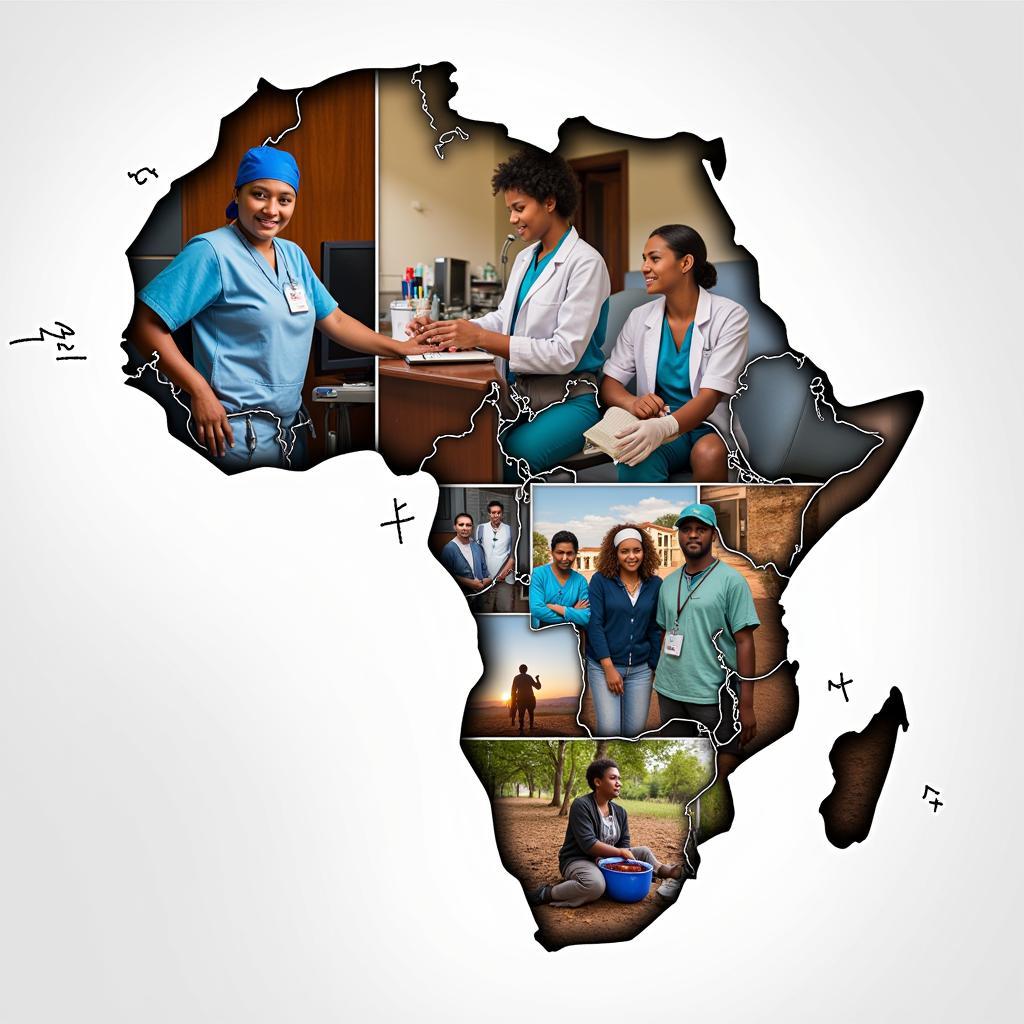The Sparkling World of the African Diamond Business
The African Diamond Business is a captivating world of shimmering riches, complex histories, and evolving ethical considerations. From mines deep within the earth to the polished gems adorning fingers and necks worldwide, the journey of an African diamond is a fascinating tale intertwined with the continent’s past, present, and future.
A Legacy of Diamonds: Africa’s Geological Treasure Chest
Africa has long been synonymous with diamonds, and for good reason. The continent holds a significant portion of the world’s diamond reserves, with major deposits found in countries like Botswana, South Africa, the Democratic Republic of Congo, and Namibia. These precious stones are not merely glittering trinkets; they are powerful economic engines, shaping the destinies of nations and communities.
 Diamond Mine in Botswana
Diamond Mine in Botswana
From Mine to Market: The African Diamond Pipeline
The journey of an African diamond from the earth to the end consumer is a multi-stage process involving various players and expertise.
-
Exploration and Mining: The journey begins with geologists and mining companies exploring potential diamond-bearing areas. Once a deposit is located, mining operations commence, ranging from large-scale open-pit mines to smaller artisanal operations.
-
Sorting and Valuation: After extraction, rough diamonds undergo meticulous sorting based on size, shape, color, and clarity. Expert gemologists then evaluate the stones to determine their potential value.
-
Cutting and Polishing: Rough diamonds are transformed into dazzling gems through the skilled artistry of diamond cutters and polishers. These artisans use specialized tools and techniques to maximize the stone’s brilliance and fire.
-
Trading and Distribution: Cut and polished diamonds enter the global market, traded in major diamond centers like Antwerp, Dubai, and Mumbai. They are then distributed to jewelry manufacturers and retailers worldwide.
 Diamond Cutting and Polishing
Diamond Cutting and Polishing
The Kimberley Process: Towards Ethical Sourcing and Conflict-Free Diamonds
The African diamond industry has faced scrutiny regarding ethical sourcing and the trade of “conflict diamonds” – diamonds mined in war-torn areas and used to finance armed conflicts. The Kimberley Process, established in 2003, is a global initiative aimed at preventing the flow of conflict diamonds into the legitimate trade. It requires participating countries to implement strict certification schemes and export controls to ensure the origin of their diamonds.
“The Kimberley Process has been instrumental in curbing the trade of conflict diamonds, but continued vigilance and improvement are crucial,” notes Dr. Abena Serwaa, an expert in mineral resource governance in Africa. “Transparency and traceability throughout the supply chain are essential for ensuring ethical sourcing and fostering consumer trust.”
Beyond the Sparkle: The Socioeconomic Impact of Diamonds in Africa
The African diamond business holds immense potential for driving economic growth and development. It provides employment opportunities, generates government revenue through taxes and royalties, and contributes to foreign exchange earnings. However, it is crucial to ensure that the benefits of diamond mining are distributed equitably and sustainably.
-
Investing in Communities: Leading diamond companies are increasingly recognizing the importance of corporate social responsibility and are investing in community development projects in mining areas. These initiatives focus on education, healthcare, infrastructure development, and livelihood diversification programs.
-
Empowering Artisanal Miners: Artisanal and small-scale diamond mining provides a vital source of income for many communities in Africa. Supporting these miners through access to training, technology, and fair market prices can significantly improve their livelihoods and promote responsible mining practices.
-
Value Addition and Local Beneficiation: Adding value to diamonds locally through cutting and polishing creates jobs and boosts local economies. Many African countries are striving to establish diamond cutting and polishing centers to capture a larger share of the value chain.
 African Woman Wearing Diamond Jewelry
African Woman Wearing Diamond Jewelry
The Future of the African Diamond Business: Innovation and Sustainability
The African diamond business is at a crossroads, poised for a future shaped by innovation, sustainability, and evolving consumer preferences.
-
Technological Advancements: Technological advancements in diamond exploration, mining, and processing are enhancing efficiency, reducing environmental impact, and improving working conditions.
-
Traceability and Transparency: Blockchain technology is being explored as a way to track diamonds throughout the supply chain, providing consumers with greater assurance about the origin and ethical sourcing of their gems.
-
Sustainable Practices: As consumers increasingly demand ethically sourced and sustainable products, diamond companies are adopting responsible mining practices, minimizing their environmental footprint, and investing in community development.
Conclusion
The African diamond business, with its legacy of dazzling gems and complex realities, is undergoing a transformation. By embracing ethical sourcing, promoting sustainability, and investing in local communities, the industry can unlock its full potential to drive positive change and contribute to a brighter future for Africa.
FAQ
-
What is the Kimberley Process Certification Scheme? The Kimberley Process Certification Scheme (KPCS) is an international initiative established in 2003 to prevent the trade of “conflict diamonds” and ensure that diamond purchases do not finance violence.
-
Which African country is the largest diamond producer? Botswana is currently the largest diamond producer in Africa and one of the world’s leading suppliers of high-quality diamonds.
-
What are the benefits of buying ethically sourced diamonds? Ethically sourced diamonds ensure that your purchase supports responsible mining practices, fair labor standards, and community development in diamond-producing regions.
-
How can I tell if a diamond is ethically sourced? Look for diamonds accompanied by certifications from reputable organizations like the Kimberley Process or the Responsible Jewellery Council (RJC). These certifications provide assurance about the diamond’s origin and ethical standards.
-
What is the future outlook for the African diamond industry? The African diamond industry is expected to remain significant in the global market. However, factors like ethical sourcing, sustainability, and consumer preferences will continue to shape its future trajectory.
Need Help Navigating the World of African Diamonds?
Contact us today! Our team of experts at African Life is here to answer your questions, provide insights, and connect you with trusted resources related to the African diamond business.
Phone: +255768904061
Email: [email protected]
Location: Mbarali DC Mawindi, Kangaga, Tanzania
We’re available 24/7 to assist you. For further information and insights, explore our other informative articles on African countries exports and imports and African exports to china total export value 2017. You can also discover more about the African coutries drc which country and explore the African dream country for opportunities and insights. Looking to explore different parts of the continent? Learn about the best African countries to migrate to.




